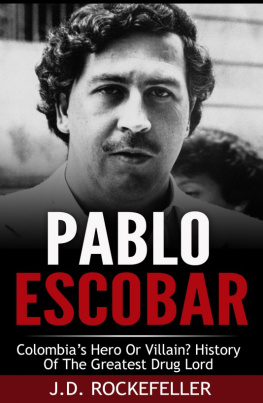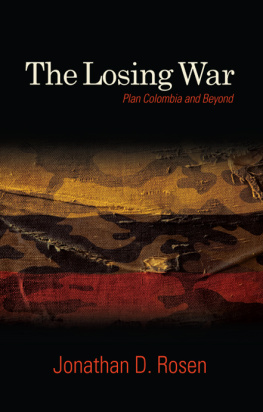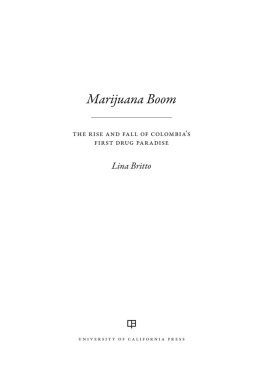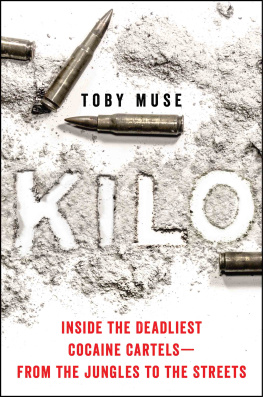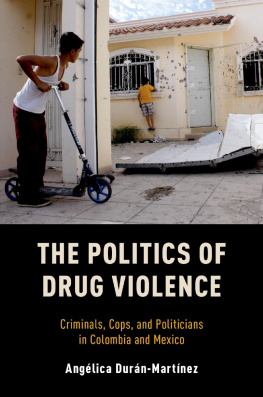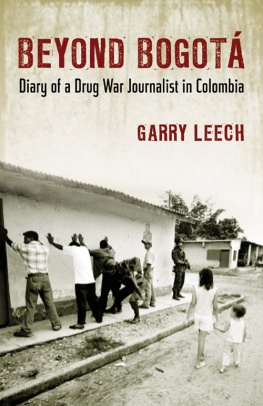ANTI-DRUG POLICIES IN COLOMBIA
A Vanderbilt University Center for Latin American Studies volume.
Edward G. Fischer, director
Anti-Drug Policies in Colombia: Successes, Failures, and Wrong Turns,
edited by Alejandro Gaviria and Daniel Meja (2016)

ANTI-DRUG POLICIES IN COLOMBIA
Successes, Failures, and Wrong Turns
Edited by Alejandro Gaviria and Daniel Meja
Translated by Jimmy Weiskopf
Vanderbilt University Press
Nashville
Translation 2016 by Vanderbilt University Press
Nashville, Tennessee 37235
All rights reserved
Originally published as Polticas antidroga en Colombia: xitos, fracasos y extravos by Ediciones Uniandes, Bogot, Colombia, in April 2011. Copyright 2011 by Alejandro Gaviria and Daniel Meja (contributing editors) and Universidad de los Andes.
This book is printed on acid-free paper.
Manufactured in the United States of America
Translation coordinator: Nicolas Vaughan
Library of Congress Cataloging-in-Publication Data on file
LC control number 2014045942
LC classification number HV5840.C7A5813 2015
Dewey class number 362.291609861dc23
ISBN 978-0-8265-2071-5 (hardcover)
ISBN 978-0-8265-2073-9 (ebook)
CONTENTS
Daniel Meja and Daniel M. Rico
Adriana Camacho, Alejandro Gaviria, and Catherine Rodrguez
Daniel Meja
Carlos Zorro-Snchez
Jorge Larreamendy-Joerns and Mara Fernanda Vence
Sandra Borda
Muriel Laurent
Arlene Beth Tickner and Carolina Cepeda
Julieta Lemaitre and Mauricio Albarracn
Manuel Iturralde and Libardo Jos Ariza
Carlos Caballero and Alfonso Amaya
lvaro Camacho
Miguel Garca
Juan Carlos Echeverry and Mara Paula Gmez
Arlene Beth Tickner, Diego Garca, and Catalina Arreaza
ACKNOWLEDGMENTS
First of all, we would like to thank the former rector of Universidad de los Andes, Dr. Carlos Angulo Galvis, who came up with the idea of creating this book. During the process of its realization, Dr. Angulo gave us his constant support and guided us toward the objective which he himself had formulated: to undertake an academic publication that would allow Universidad de los Andes to contribute to an objective, constructive, and informed debate on a subject that is crucial for the future of Colombia. We would also like to express our thanks and acknowledgments to former president of Colombia, Csar Gaviria Trujillo, who supported this project in many ways and stimulated our interest in and curiosity about an in-depth treatment of the subjects dealt with in this book. We would further like to thank the general manager of the Central Bank of Colombia (Banco de la Repblica), Dr. Jos Daro Uribe Escobar, and the Open Society Institute for the partial funding of this book.
During the first semester of 2010 at the University de los Andes two events were held in which the preliminary versions of the chapters were presented and discussed. We would like to especially thank the former director of the National Police (Polica Nacional de Colombia), General scar Naranjo, for his participation in both events, as well as that of other persons who have been actively involved in the formulation of anti-drug policies in Colombia, among them mar Figueroa, Sergio Jaramillo, Alberto Lozano, Ins Elvira Meja, Augusto Prez, and Ricardo Vargas. Academics of international renown also participated in these events. Among them, it is worth mentioning Jonathan Caulkins of Carnegie Mellon University, Beau Kilmer of RAND, Elvira Mara Restrepo of the University of Miami, Peter Reuter of the University of Maryland, and Juan Tokatlian of the Torcuato Di Tella University.
This book would not have been possible without the active and enthusiastic participation of the twenty-four authors of the fifteen chapters that compose it. To all of them we would like to express our sincerest thanks for their effort to bring this project to completion and their infinite patience in complying with all the requirements needed for its publication. We would also like to thank Felipe Castaeda, general editor of Ediciones Uniandes, and his work team, made up of Eduardo Franco, Felipe Rubio, Carolina Mazo, and Alejandra Muoz. Their support and cooperation was indispensable in turning the publication of this book into a reality. Finally we would like to thank Guillermo Dez, who revised the final version of the Spanish manuscript with a critical eye, along with Mara Jos Uribe.
PREFACE
The publication of this book represents a landmark in the manner of confronting the problem of illegal drugs in Colombia. In the course of three decades, Colombia has acted in line with the prohibitionist policies promoted by the United States, generally based on the war against drugs inaugurated by President Richard Nixon forty years ago. No country in the world has paid as high a cost as Colombia in terms of the lives of its political leaders, judges, police officers, soldiers, journalists, and tens of thousands of innocent civilians, nor suffered a graver damage to its democratic institutions.
Is it fair that this happens in the name of a failed and worn-out policy? The same thing is happening in Mexico, where the deaths run into tens of thousands. Our country has paid an immeasurable economic cost in this still unfinished fight against narco-terrorism. Even during the period when we have received significant aid from the United States, under what is known as Plan Colombia, nine out of ten dollars have come from the Colombian government, according to the United States Congressional Budget Office.
The moment has come to evaluate the results of this strategy, which has so few results to show beyond statistics about interdiction efforts, drugs seizures, the persecution of drugs cartels, deaths, and prisoners in jails. Nothing has been achieved in reducing consumption in the United States, by far the biggest market for drugs. It is just the opposite: the use of methamphetamines has shot up and more people are addicted to this drug now than to cocaine. There the US government has just officially dropped the term war on drugs because it does not allow for the designing of effective policies. The US government has said that the strategy of controlling the problem through the reduction of supply does not work and that the only viable solution is to reduce consumption by 15 percent during the Obama administration. More than 70 percent of the population in the United States thinks that the war on drugs has failed. President Obama said it himself in his campaign for the Senate. And the growing tolerance toward the use of marijuana is evident, to the point where many people, even unconditional adherents of prohibitionism, believe that its legalization is just a matter of time.
The United States has made an extraordinary effort in the battle against all illegal drugs. The problem is that the $40 billion in question is spent more on judicial, police, and prison system than on policies for treatment and prevention. More people are imprisoned for narcotics trafficking in the United States (more than 500,000) than those jailed for all crimes in the Europe as a whole. When the war began there were 50,000 such prisoners; now the figure has multiplied by ten, without any visible effects on consumption. It is frankly incredible that $450,000 is spent each year on the jailing of a youngster who, at worst, once tried marijuana. Despite that, 60 percent of US prisoners use marijuana, according to the latest study by the Inter-American Dialogue.



